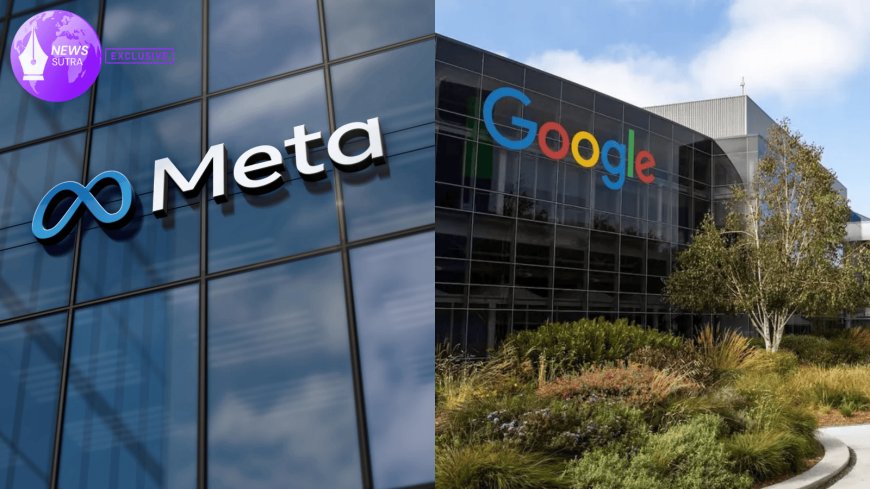Meta’s $10 Billion Google Cloud Deal Sparks Fresh Privacy Concerns for U.S. Users
Meta’s $10B Google Cloud deal raises privacy concerns for U.S. users. Experts warn of data-sharing risks, loopholes, and oversight gaps.

WASHINGTON, D.C. — In a landmark technology move, Meta Platforms has signed a $10 billion multi-year deal with Google Cloud, one of the largest enterprise partnerships in recent years. While the agreement promises faster data processing, stronger AI model development, and global infrastructure expansion, privacy advocates warn it could intensify long-standing concerns over how American user data is handled, stored, and monetized.
The Deal at a Glance
According to details obtained through regulatory disclosures and industry insiders, the partnership will give Meta access to Google’s advanced computing power to support its AI-driven advertising engines, social platforms, and future metaverse infrastructure.
Analysts say the deal reflects Meta’s urgency to reduce reliance on its in-house data centers, especially as demand for large-scale AI training accelerates. Google Cloud’s massive reach, with data centers spread across multiple continents, will provide Meta with scalability that its own infrastructure cannot match in the short term.
But the alliance between two of the world’s most powerful data-driven corporations immediately raised red flags among privacy experts.
Contract Clauses Under the Microscope
Digital rights researchers reviewed parts of the agreement, highlighting clauses related to data residency, third-party access, and cross-border transfers. While Meta has pledged to keep U.S. user data within American borders whenever possible, the deal leaves room for certain datasets to be processed abroad.
“Once you introduce a second party like Google into Meta’s already complex data ecosystem, the risks multiply,” said Lisa Franklin, senior analyst at the Electronic Privacy Information Center (EPIC). “Even with encryption standards in place, the potential for loopholes around analytics and metadata sharing is enormous.”
A notable point of concern is the shared liability clause. If a breach occurs within Google’s infrastructure but involves Meta’s user data, both companies may avoid full accountability, leaving consumers in legal limbo.
What This Means for U.S. Users
For everyday Americans, the deal raises pressing questions:
-
Will Facebook, Instagram, and WhatsApp data be stored outside the United States?
-
Could Google’s advertising arm gain indirect insights into Meta’s user base?
-
Are there sufficient legal safeguards under U.S. law to protect sensitive communications?
Civil liberties advocates argue that neither company has a flawless record on privacy. Meta continues to face scrutiny following the Cambridge Analytica scandal, while Google has been fined by the European Union multiple times for data protection violations.
“Putting billions of user records into a shared cloud environment is like stacking dynamite in the same warehouse,” said Dr. Kevin Ortiz, professor of cybersecurity law at Georgetown University.
Digital Rights Groups Call for Oversight
Several watchdog organizations, including the Center for Democracy & Technology, have called on Congress to examine the deal. Lawmakers from both parties have also signaled that data monopolies could become a focal point in the coming year’s hearings.
One proposal gaining traction would require any cloud service contracts above a certain threshold to undergo a Federal Trade Commission (FTC) privacy review before approval.
“Big Tech consolidation of data assets is not just a competition issue—it’s a national security issue,” Sen. Amy Klobuchar (D-Minn.) told reporters last week.
Industry Reactions and Business Implications
On Wall Street, the partnership is seen as a strategic necessity. Meta has faced operational bottlenecks as it races to develop advanced AI recommendation systems for social platforms and advertising products. The agreement could give it an edge over rivals like Amazon, which already dominates cloud computing.
For Google Cloud, the deal is another win in its battle with Amazon Web Services (AWS) and Microsoft Azure. Industry experts say the contract alone could shift market share dynamics in the enterprise cloud sector.
Still, consumer trust may ultimately determine the outcome. “If users feel like their personal data is being shuffled around without transparency, that backlash could erode Meta’s social platforms even further,” warned Forrester Research analyst Samuel Duncan.
Expert Forecasts: What Comes Next
-
Short-term: Expect Meta to integrate Google’s AI and storage capabilities into its advertising and VR systems within the next 12 months.
-
Medium-term: Privacy watchdogs will likely push for federal review, possibly delaying certain aspects of deployment.
-
Long-term: If unchecked, the partnership could set a precedent for Big Tech cloud oligopolies, raising systemic risks around competition and consumer rights.
Backlinks for Reference
For readers seeking deeper insights into privacy and technology oversight:
-
Electronic Privacy Information Center (EPIC) — watchdog organization monitoring digital rights.
-
Federal Trade Commission – Data Privacy and Security — U.S. government guidance on consumer data protection.











